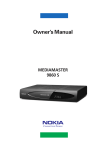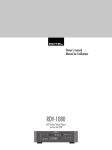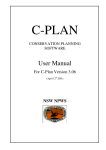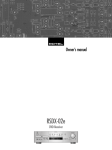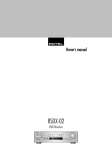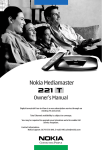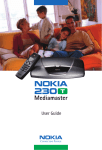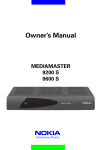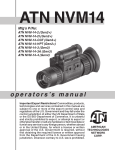Download GE PVWS930 Range User Manual
Transcript
Bruksanvisning Owner’s Manual MEDIAMASTER 9820 T S1 MEDIAMASTER 9820 T Contents GENERAL OPERATION OF THE MEDIAMASTER FOR YOUR SAFETY REMOTE CONTROL Rear Panel Front Panel ABOUT THE SMARTCARD Subscription TV Services with a Smartcard (Viaccess) INSTALLATION OF THE MEDIAMASTER Preparing the Remote Control Connecting to the TV aerial Connecting the Mediamaster Connecting the Mediamaster to the TV Connecting a TV and VCR Connecting an Analogue Satellite Receiver and VCR Connecting a HiFi system Connecting to the telephone wall socket Tuning Procedure when RF Connections are Used First time installation General Information The Welcome Menu Language Channel Search Channel Search Progress Viewing Mode General Information Programme Information The “i” (Information) Button Guide 4 4 5 6 6 7 7 8 8 8 10 10 10 11 11 11 12 13 13 13 13 14 14 15 15 15 16 16 List of TV or Radio Channels Options (Green Button) TV Release (0) Video Recording The TEXT Button (Teletext) Main Menu General Information Channels Edit Channels Guide System Configuration Channel Search Antenna Configuration TV Settings Modem Configuration Receiver Upgrade Reinstall User Preferences Language Preferences Parental Control Change access code Appearance Preferences System Information Conditional Access GLOSSARY OF TERMS PROBLEM SOLVING FRONT PANEL DISPLAY TECHNICAL SPECIFICATIONS MENUS SCREEN STRUCTURE 17 17 18 18 18 19 19 19 19 23 23 23 23 24 24 25 25 25 25 26 26 26 27 28 29 30 31 32 33 Nokia Multimedia Terminals operates a policy of continuous development. Therefore we reserve the right to make changes and improvements to any of the products described in this manual without any prior notice. The EMC Directive 89/336/EEC is applied to this product. DiSEqC™ is a trademark of EUTELSAT Nokia is a registered trademark of Nokia Corporation. Copyright © 2000. Nokia Multimedia Terminals. All rights reserved. GB 3 GENERAL OPERATION OF THE MEDIAMASTER Throughout this manual you will notice that the everyday operation of your Mediamaster is based on a series of user friendly onscreen displays and menus. These menus will help you get the most from your Mediamaster, guiding you through installation, channel selection, viewing and many other functions. All functions can be carried out using the buttons on the remote control, and some of the functions can also be carried out using the buttons on the front panel. If at any time when using the menus (except Installation and Reinstall) you want to return to the normal TV mode, press the EXIT button. The Mediamaster is easy to use, always at your command and adaptable for future advances. Please be aware that new software may change the functionality of the Mediamaster. Should you experience any difficulties with the operation of your Mediamaster, please consult the relevant section of this manual, including the Problem Solving, or alternatively call your dealer or a customer service adviser. Please not! The first thing to do before sending the Mediamaster to service is to: 1: Perform ”Diagnostic” procedure in System Information menu. 2: Try downloading new software into the Mediamaster. With this procedure, the new software may solve the problem in the quickest and most efficient way. See the relevant section ”Receiver Upgrade” further on in this manual. FOR YOUR SAFETY • Allow clear space around the Mediamaster for sufficient ventilation. • Do not cover the Mediamaster or place it on a unit that emits heat. • Use a soft cloth and a mild solution of washing-up liquid to clean the casing. • Never allow liquids, spray or other materials to come into contact with the inside of the Mediamaster. • Do not connect or modify cables when the Mediamaster is plugged in. GB 4 • Do not remove the cover. • Do not allow the unit to be exposed to hot, cold or humid conditions. • Service should be carried out only at a Nokia Authorised Service Centre. • Please note that the only way to isolate the Mediamaster completely from the mains supply is to unplug the mains lead! REMOTE CONTROL This section describes how to operate the Mediamaster using the buttons on the remote control. Some of the functions can also be carried out using the buttons on the front panel. To switch the Mediamaster in and out of standby mode. EXIT TV To return to the viewing mode from a menu without s t o r ing settings (in menu mode). To turn the sound off/on (mute). - + To adjust the volume of digital programmes. The Mediamaster’s maximum level is controlled by the TV’s present volume setting. 0-9 To change channel and to select individual menu options. Note: If 0 is entered as the first digit, the TV Release functionality is activated (see below). 0 TV Release. To switch between digital TV, analogue TV and analogue satellite TV and VCR, when your systems are connected by SCART leads. Info. To display short and extended information (if transmitted) about current and next programmes. BACK To go back one level in the menus without storing settings. TEXT To select teletext information. Press to enter teletext (if available). MENU To display or exit from the ”Main Menu” screen. GUIDE To obtain a list of present and following programmes for the available channels. This information is only shown if your Service Provider transmits programme information (EPG information). P+ P- To change channels up and down. To change page in a menu/list/text if more than one page is available. To browse through teletext history. ▲ ▼ To move up/down in the menus and to change channels. To change settings in menus. OK To confirm choices and selection of a highlighted item. To display the TV channel list. (Red) At the moment, no function. OPTION (Green) To select service options in viewing mode. See ”Options”. FREEZE (Yellow) To select the freeze function. Press once to freeze the screen picture. Press any other key to go to normal mode again. (Blue) To toggle between present and previous TV/Radio channels. GB 5 Rear Panel Mains lead 230 V AC ± 15% 50-60 Hz 230 V ±15% 50 Hz DIGITAL AUDIO phono connector S/PDIF output for connection to a HiFi system AUX SCART for connection to a VCR, or an analogue satellite receiver TELEPHONE for modem connection to the telephone wall socket TV/VCR for an RFcable to the aerial input of the TV or VCR TELEPHONE DIGITAL AUDIO TV / VCR AUX L TV TV AERIAL SERIAL AUDIO WARNING ! DO NOT OPEN – ELECTRICAL SHOCK HAZARD R 44 10285 AUDIO L R phono connectors Stereo outputs for connection to a HiFi system TV SCART for connection to the TV SERIAL PORT to read and load data information TV AERIAL for a terrestrial (conventional) TV aerial or an additional small indorr antenna Front Panel EXIT to return from a menu to normal TV picture MENU to select Main menu to put the Mediamaster in and out of standby Display shows channel information, error messages, remote control commands and time in stand by mode EXIT MENU OK Slot for a Smartcard GB 6 Slot for a CA module with a Smartcard Button for the CA for several functions, e.g selecting channels, module highlighting an option release within a menu or scrolling through channels OK for confirming choices and to display the channel list for selecting settings in a particular menu ABOUT THE SMARTCARD AND CA MODULE To be able to receive terrestrial scrambled digital channels you will need a Smartcard from the Service Provider, ”Senda”. Senda is the the programme distributor. Please note that a Smartcard may only be valid for a single Service Provider and due to this, a specific range of channels. The Smartcard and the CA module may also provide access to special menus not described in this manual. If so, please follow the instructions from the Service Provider. Note: The Smartcard is distributed by your Service Provider. After inserting the card, leave it in the slot permanently. Do not remove it again, unless your Service Provider asks you to do so. This is important, because if your Service Provider wants to download new information to the Smartcard, the card has to be in the slot. Subscription TV Services with a Smartcard (Viaccess) EXIT MENU OK Only for subscription TV services coded with the Viaccess CA system. • Insert your Smartcard fully into the left slot behind the lid of the front panel of the Mediamaster. The gold chip should face downwards and inwards. Note! The gold chip must be on the underside and inwards of the smartcard GB 7 INSTALLATION OF THE MEDIAMASTER The box for your Mediamaster should contain the following items: • the Mediamaster • a remote control with 2 AAA batteries • a SCART lead (fully featured 1,0 metre) • an aerial/RF lead (double screened 1,5 metres) SCART lead RF lead Owner’s manual License agrement • a telephone modem cable (10 metres with a splitter) Telephone modem cable • an Owner’s Manual • a Software License agreement About the SCART sockets • The rear panel of the Mediamaster is equipped with 2 SCART sockets (see diagram). When you connect other products to any of these sockets, always use fully featured SCART leads (as supplied). There are “less well specified” SCART leads on the market and picture quality could be reduced if you use them. Preparing the Remote Control • Remove the cover on the battery compartment at the bottom of the remote control. • Insert the 2 AAA (1,5 V) batteries, as shown in the diagram, taking care to observe the + and - markings indicated inside. • Replace the cover. Connecting to the TV aerial You can connect the Mediamaster to the following antennas: 1.Standard outdoor antenna Where possible, use an outdoor roof antenna (UHF 21-69). Please note the following: • In some residential buildings, the communal roof-mounted antenna includes a filter and channel selector. If so, the antenna will probably not work with the Mediamaster. Please consult the property owner. • Many older roof-mounted antennas can only receive a limited number of channels. As a result, digital channels transmitted on higher frequencies may be difficult to receive. The problem can be solved by replacing the roof antenna. GB 8 SCART socket • Certain outdoor antennas are pointed at an analogue slave transmitter. The roof antenna should be pointed at a digital TV transmitter. • It is not always advisable to position the antenna as high as possible. If problems arise, experiment with different antenna heights. The same applies to analogue transmissions. 2. Indoor or window-mounted antenna This type of antenna may be enough if the reception conditions are very good. If an indoor antenna is used, please note the following: • Use an antenna for UHF channels 21 - 69, such as a directional antenna. • The directional antenna should have horizontal polarisation (preferably rotatable). • Place the antenna by the window and point it towards the TV transmitter, if possible. • An antenna with an amplifier is recommended as it may provide a stronger signal. • Attenuation of the TV signal varies according to the building material. The signal penetrates thick stone or concrete walls poorly. A window improves reception. However, a wooden building is no barrier to digital TV signals. About antennas Radio and TV signals can be blocked by buildings, mountains and the terrain. If the receiver is located in a depression in the ground, behind a mountain or in a concrete building, the quality of reception may vary considerably. Because the TV signal is amplified by reflections, reception is often better than with analogue reception and “ghost” images can be avoided. Reflection can even be used for reception by pointing the antenna at a mountain or a high building, providing that they do not block the transmitter. As with analogue TV, weather can affect reception. This is the case particularly at the edge of the reception area for digital transmissions. GB 9 Connecting the Mediamaster There are many different types of TV/VCR and other equipment that you can connect to the Mediamaster. In this manual you will see some of the most common ways to connect your equipment. If you use RF leads you will have to tune your TV and VCR to the Mediamaster output channel (see page 12). If you have problems with your connections and need help, contact your dealer or Service Provider. Connecting the Mediamaster to the TV TV • Connect a SCART lead between the main SCART socket on the TV and the TV SCART socket on the Mediamaster. Aerial • Connect an RF lead from the TV/VCR output on the Mediamaster to the RF input socket on the TV. 2 • Connect the TV aerial to the TV AERIAL input socket on the Mediamaster (or use an indoor aerial). 1 RF SCART Connecting a TV and VCR Antenn Refer to your VCR’s manual for full instructions. SCART If your TV and VCR have two SCART-sockets RF • Connect a SCART lead between the main SCART socket on the TV and the TV SCART socket on the Mediamaster. • Connect a SCART lead between the VCR and the AUX SCART socket on the Mediamaster. Video RF RF SCART 2 1 • Connect a SCART lead between the VCR and the second SCART socket on the TV. • Connect an RF lead from the TV/VCR output on the Mediamaster to the RF input socket on the VCR. SCART Mediamaster • Connect an RF lead from the RF output on the VCR to the TV AERIAL input socket on the TV. Antenn • Connect the TV aerial directly to the TV AERIAL input socket on the Mediamaster. RF Video If your TV has a SCART-socket and the VCR has one SCART-socket • Follow connection details from above, but without the 3rd SCART lead. Your VCR will then need to be tuned to the Mediamaster RF 2 SCART GB 10 SCART 1 Mediamaster Connecting an Analogue Satellite Receiver and VCR • Connect a SCART lead between the main SCART socket on the TV and the TV SCART socket on the Mediamaster. • Connect a SCART lead between the TV SCART socket on the satellite receiver and the AUX SCART socket on the Mediamaster. • Connect a SCART lead between the VCR and the 2:nd SCART socket on the TV (if available). Aerial 2 1 • Connect an RF lead from the RF output on the VCR to the TV aerial input on the TV. Dish RF SCART • Connect an RF lead from the RF output on the satellite receiver to the RF input socket on the VCR. • Connect an RF lead from the TV/VCR output on the Mediamaster to the RF input socket on the satellite receiver. • Connect the TV aerial to the TV AERIAL input socket on the Mediamaster. • Connect the coaxial cable between the LNB and the LNB socket on the satellite (analogue/digital) receiver. Both the VCR and the analogue satellite receiver must be tuned to different UHF channels than the Mediamaster when using RF-connectors. The analogue satellite receiver must be switched to OFF (standby) when you want to watch digital terrestrial channels from the Mediamaster. VCR RF Mediamaster LNB cable Satellite receiver Connecting a HiFi system • Connect an RCA/Cinch stereo cable from the AUDIO L R sockets on the Mediamaster to the LINE, AUX, SPARE or EXTRA input sockets on your HiFi system. • If available you can connect an RCA/Cinch single cable from the DIGITAL AUDIO socket on the Mediamaster to your HiFi or Dolby Pro Logic system. Note: To avoid interference you must use a screened audio cable. Connecting to the telephone wall socket You will be offered interactive services from your Service Provider. You may then need to connect the Mediamaster to the telephone line. • Connect the telephone modem cable (supplied) from the TELEPHONE sockets on the Mediamaster to a telephone socket. GB 11 Tuning Procedure when RF Connections are Used This procedure is necessary only if your Mediamaster is connected to the TV with an RF lead and no SCART leads are used To tune your TV to the RF signal you might also need your TV manual in addition to this manual. The steps below explain what to do if you have been unable to use SCART leads in your connection. • Plug in your Mediamaster. Tuning your TV to the Mediamaster • Select a channel number on the TV that is not currently used for other TV channels. • Follow the instructions in your TV manual to tune the TV channel selector to UHF channel 43 (this is the Mediamaster’s factory preset UHF channel). If you are already using this channel, select another non occupied UHF channel between 21to 69 on the TV. • If you need to change UHF channel you do as follows: First you change on the Mediamaster. Use the or buttons on the front panel of the Mediamaster, or on the remote. You will see the UHF channel number displayed on the front panel of the Mediamaster. Then you tune the TV channel selector to the same UHF channel. • When you have correctly changed the UHF channel number you will see the ”Welcome” menu on the TV screen. If there is interference from other channels you will have to change the chosen UHF channel. • Follow the instructions in your TV manual to store this UHF channel as the channel used by your Mediamaster. You will have to select it when you want to watch terrestrial digital TV channels. • Once the welcome message is visible, press the OK button on the Mediamasters remote control to start the installation procedure. If for some reason you have to change the RF channel later, you can do this by using TV settings menu further on in this manual. If you have a VCR connected it must be tuned to a different UHF channel (between 21 to 69) than the Mediamaster. You may now proceed to “First Time Installation.” GB 12 FIRST TIME INSTALLATION General Information Once you have correctly connected the Mediamaster, you also have to perform a “First Time Installation.” During this procedure, helpful information is displayed at the bottom of the menus. Please note! The OK button always confirms a selection within these menus, and pressing it will take you to the next step in the installation process. However, and this is important, often more than one value has to be entered in a menu. First, perform all necessary settings on the different lines. Then, confirm them all simultaneously by pressing OK. You can always go back to the previous menu by pressing the BACK button. buttons to move upwards and downwards from one Use the line to another. Use to change settings. You can also use the numeric buttons on the remote control to select a line in a menu and to enter numeric values. The Welcome Menu This picture indicates that you have started the installation procedure. (CH 43 is indicated on • Change UHF channel number with the front display of the Mediamaster). You only need to change the UHF channel if the channel is close and interfere with a transmitting analogue or digital channel in your area. • Press OK on the remote control to start the Installation procedure. Language Select the desired menu language. This will also be the main language for audio and subtitling. GB 13 FIRST TIME INSTALLATION Channel Search The Channel Search procedure can be performed in two different ways. • “Automatic Search” or “Manual Search.” Automatic Search • Start the Automatic Search on the digital terrestrial network by pressing OK. Manual Search When you perform a Manual Search you first need to enter some parameters for the channel search to work. The information you need to enter in this menu is available from your Service Provider. Select channel: Specify the UHF channelnumber between 21 to 69. If you enter the wrong figure(s), erase with the button. Transmission Mode: Select 8k. Guard Interval: Select the value as you want. Network Search: Select “Yes” if you want to search on all frequencies in a specific network. • Press OK to start searching for channels. Channel Search Progress In the Channel Search Progress Menu, you can start searching for terrestrial digital channels offered by the TV transmitter for which your antenna has been configured. All TV channels found will be listed in a column on the screen. Please note that the search procedure may take a few minutes. When the search procedure has ended, the screen will show how many TV channels have been found. Press OK and continue to press OK until the channel number 1 shows on the front panel display. You will see the corresponding programme on the TV screen. GB 14 VIEWING MODE General Information The following describes the basic functions of your Mediamaster while watching terrestrial digital TV . Some of the functions described here are dependent on the Service Provider and can only be used if they are included in the transmitted programme information. Please note, that during the Channel Search procedure, the Mediamaster may download a large number of channels. This may include channels also those to which you do not have access unless you have a Smartcard. If you select a programme to which you do not have access, you will get a message on the screen. While viewing, the current channel number will be shown on the front panel display. In addition to the normal functions like switching the Mediamaster in/out of stand-by, changing the volume etc. (ref. to the overview of the remote control) there are some other useful functions which will be explained in this part of the manual. From this functions you can always go back to the previous menu by pressing the BACK button or return to TV mode by pressing EXIT. Channel list Programme Information Information about the current programme Every time you change channels you will receive programme information for a few seconds. (In the “User Preferences” menu you can select how long this information will be shown.) The information may include: Current time. Channel list. Channel number and name. Name of the current and next programme. The start and total time of the current programme. A bar, indicating the elapsed time of the current programme. Recommended lowest age limit for watching the programme. The start and total time of the next programme. Programme information will only be available if it is included in the transmission. Otherwise a “No information available” message will be shown. You may change channel lists with the buttons. 12 Current time Information about the next programme Channel number and name Age limit information GB 15 VIEWING MODE The “i” (Information) Button The Mediamaster has the ability to display information about programmes currently being broadcast as well as those being broadcast next. By pressing the “i” button while watching TV you will get a special Programme Information Banner. Select channel with or the numeric buttons. The “i” symbol is coloured blue when displaying information about the current channel, and red when information for another channel is shown. • Press “i” again to get more information about the current programme. • If a lot of information is available you can use the double arrow button to see the rest of the text. • Press “i” a third time to return to TV mode. • In this view, you can select to get information about the curbuttons. rent and next programme by using the • You can leave the menus at any time and return to viewing TV by pressing EXIT. * Guide Press MENU. Select GUIDE. Press OK and you get access to the Nokia EPG which will give the titles of the current and next programmes on different channels. Use the buttons to move the cursor to another programme. Use the buttons to get information about next programmes. Use the double arrow buttons to move a page at a time up and down. When a line is highlighted, you can get more information about this programme by pressing the “i” button. By pressing GUIDE in TV mode you get access to the EPG from Senda (if this information is transmitted in the signal). GB 16 VIEWING MODE List of TV Channels At the channel search procedure, a Channel lists named “Channels” containing all channels are created. Name of the Channel list Indicates a closed network In the “Channels” list scrambled channels are marked with a picture of a Smartcard (if this information is transmitted in the signal) and locked channels are marked with a padlock. If you have performed a new channel search the new channels found will be marked with a star in the “Channels” list. When viewing TV you can access the Channel List by pressing OK. The channel list can also be selected from the main menu. At the top of the menu you will see the name of the list. The current list is the one in which the channel you are watching right now is located. • If the list contains a large number of channels, you can close networks to reduce the number of channels. You open/close a network by marking it and pressing . A closed network is Channel number indicated with . and name • Change channel lists with . buttons or • You can change channel by stepping with the enter the channel number with the numeric buttons on the remote control. Network name Indicates a scrambled channel • To change one channel list page at a time, use the double arrow buttons. • Press OK when a channel name is highlighted to start watching to it. • You can also get more information about a marked (highlighted) channel by pressing the “i” button. Options (Green Button) By pressing the OPTION button, you open a menu in which it is possible to enter temporary settings. The menu will only appear if the programme contains any options to change. Settings made in this “options menu” are only valid for the programme you currently are watching. If you leave the programme and return to it again, the temporary settings will be gone. Audio Language If available, you can select among the different languages being broadcast. Subtitle Language If available, you can select among different subtitle languages. If you select “OFF”, you will not get any subtitling at all. GB 17 VIEWING MODE Format If you have a TV set with a 4:3 picture format, and the transmission is in 16:9, you can select Fullscreen or Letterbox to change display format. Fullscreen will fill up the screen vertically, but cut off some information from the left and right sides of the picture. Letterbox will give a complete picture, but leave black areas at the top and bottom. TV Release (0) With the 0 button you can toggle between: digital terrestrial TV analogue terrestrial TV video (the video must be on) (This is only valid if the units are connected via SCART cables, and not by a RF connection.) Video Recording Please note, that during the recording of a programme, everything shown on the screen will be registered! For example, if you call up a menu from the Mediamaster on the screen, the menu will be recorded! The TEXT Button (Teletext) • Pressing the TEXT button will open a Teletext page (if Teletext is transmitted.) Select teletext pages with the numeric buttons on the remote control. • You can also quickly step to the different page alternatives shown in any page by pressing . • Press OK on a selected number to go to that page. • Press EXIT, BACK or TEXT to return to TV mode. • The “0” button will show the index page (normally page 100.) will show the next or previous teletext page. • You can use the double arrow buttons to browse through the pages you just have visited. GB 18 MAIN MENU General Information Many of the functions of the Mediamaster are available from the Main Menu. • Press MENU to open it. Channels Please refer to “List of TV channels” on page 17. Edit Channels From these menus you can create and edit channel lists. You can, among other things, create favourite lists; add, delete, rename and arrange the order of the channels within the lists. In the “All TV” list the channels are presented network by network. First the name ”Marknätet”(terrestrial network). Then the name of the network (region/TV-transmitter) for which your antenna has been configured. The “All TV” list can contain a lot of channels. By creating your own favourite lists you can make channel handling a bit more convenient. Important when editing channels! Changes in the Edit Channels menus always take immediate effect; it is not possible to cancel changes by pressing BACK! GB 19 MAIN MENU Create list From here you can create your own favourite lists, containing the channels you watch most frequently. You can give each list a specific name, e.g. “Sport” or “Films.” When a favourite list is selected, you see only those channels defined in the list. When you have given the list a name; press OK and you will enter the “Select Channels” menu (see next page) from where you add channels to the list. How to give a specific name This procedure is the same whether you enter a name for the first time or change an existing. • Move to a new character position by using . • To delete the last character use . . • Enter the characters one by one (A....Z, 0....9) by using To speed up the procedure a bit you can use the double arrow buttons to jump 3 letters at the time. • Figures can also be entered with the numeric buttons on the remote control. • The next letter will be shown above the current, and the previous below it. • Toggle between capital and lowercase letters with the blue button. Rename list From here you can give an existing list a new name. Use the arrow buttons the same way as when you created the list. Rearrange lists If you have created several Favourite lists you can determine the sequence in which the lists will appear. Delete list If you want to delete a Favourite list completely, select the list and press OK. GB 20 MAIN MENU Select Channels From this menu you add and remove the channels in your Favourite Lists. You use the “All TV” list as basis to select the channels from. A channel is added or removed by pressing the OK button. The square to the right on a line will be empty for removed channels, and will contain an “x” for added channels. • If you have a Favourite list that contains several satellites and networks, you can close the one(s) you are not going to work with. You open/close a satellite or network by first marking it and then pressing . A closed satellite/network is indicated with on the line. • Move to desired channel(s) with , double arrows or the numeric buttons, and add/remove them by pressing OK. • When you are ready, confirm the selections and leave the menu by pressing BACK or EXIT. Lock Channels To get to this menu you first have to enter your access code. From here you can lock (and later unlock) channels in any of the lists in order to prevent e.g. your children from watching. Select the channel you want to lock and press OK. Repeat the procedure for each channel you want to lock. When you lock a channel in any list, the channel will automatically be locked in all other lists. A locked channel will be marked with a padlock symbol. When watching TV, you will be asked to enter your access code before you can watch a locked channel. Rename Channels Within any of your favourite lists you can rename the channels. Mark the channel you want to rename and press OK. The Rename dialogue box will then appear and let you modify the existing name. To enter the new name, please follow the instructions under the headline “How to give a specific name” on page 20. When you have changed a channel name, the new name will appear in all lists where the channel is included. GB 21 MAIN MENU Rearrange Channels From here you can arrange the sequence for the channels within your favourite lists. • With , mark the channel you want to move to a new position within the list. • Press again and the right side of the marked channel will change to . • Move the channel to the desired position with OK. and press It is also possible to first mark several channels, and then move them all simultaneously. • For each channel, press the marked channels. button to add it to the set of • When a number of channels are marked this way and you want to move the whole set of channels, press again. • The marked channels will now be put together into one group. • The right side of the first and last marked channel will change to arrows respectively. • Use the corresponding buttons to move the selected channels to a new position within the list. • When the channels are in the position you want, press OK. Delete Channels From here, when the “All TV” list is selected in the “Edit Channels” menu, you can delete channels. Please note. Channels deleted this way will be permanently deleted. The only way to get them back is to perform a new channel search. To delete channels: Mark the channel you want to delete and press OK. You will be asked if you really want to delete it. If so, confirm by pressing OK once more. If not, press BACK. Remove Channels From here, when the a favourite list is selected in the “Edit Channels” menu, you can remove channels from those lists. Mark the channel you want to remove and press OK. You will be asked if you really want to remove it. If so, confirm by pressing OK once more. If not, press BACK. Channels removed from a list this way are not permanently deleted. They are still available from the “All TV” list. GB 22 MAIN MENU Guide • Press GUIDE to get access to the receiver’s EPG. Refer to page 16. System Configuration You will be asked to enter your access code before you can open this menu. The code is preset to 1234 from the factory. (The code can be changed from the Parental Control menu. Refer to page 26.) If you want to customize the system to suit you better, you can specify some settings from the submenus in the “System Configuration” menu. Please note that many of these functions are the same as in the “First Time Installation.” Channel Search The Channel Search procedure can be performed in different ways. You can perform an Automatic or a Manual Search. Automatic Search Refer to page 14. Manual Search Refer to page 14. GB 23 MAIN MENU TV Settings From here you can adjust settings concerning your TV. TV screen format Select your TV screen format. The 4:3 format is the standard format for most TV screens. Select 16:9 for a wide screen TV. TV signal If the teletext function does not work when watching channels from an analogue satellite receiver connected to the Mediamaster, change this setting from RGB to PAL. RF channel Select this alternative if you have to change the RF channel. If you change the RF channel number in the Mediamaster, you must also change it to the same value on the TV. If you do not, the picture will become black. Always test the receiver and any units connected to it before changing the RF channel. Never use an RF channel number that is close to a transmitting channel (± one channel number) or that is used by any of the connected units. RF modulator type If the Mediamaster is connected to the TV by an RF lead, you can select the RF modulator type. The RF Modulator affects a channel’s audio. If you get picture but no sound, the RF modulator selection might be wrong. Select UK (PAL I) if the Mediamaster is used in the UK. Select Normal if it is used elsewhere. Position of the RGB output butAdjust the horizontal position of the TV picture with the tons. (The “TV signal,” see above, must be set to RGB for this function to work.) Modem Configuration When you connect the Mediamaster to the Telephone net via the built-in modem specify the necessary settings in this menu. Pulse or tone: Select the alternative which is valid for your system. If you are unsure, contact your telephone distributor. Prefix digit: If the connection goes via a switchboard, select the digit which opens the line. Digits after pause: Possibility to add a pause between the country prefix and the ordinary number by long-distance calls. (This function is not necessary by modern switchboards). In the future it might be possible to perform electronic transactions such as: Pay Per View (PPV), Home Shopping, Programmevoting and Banking etc. via the built-in modem. GB 24 The RF channel number will be indicated on the front display of the Mediamaster. MAIN MENU Receiver Upgrade In order to keep the Mediamaster up-to-date, it will be possible to download new versions of the system software via satellite and from the Internet. New software may include new or improved features for existing menus. Enter this menu to check for new software. If new software is available you will get information in the menu on how to proceed. If you download new software from ”Nokia Internet Pages”, you transfer the software from the computer to the Mediamaster via the serial port. IMPORTANT! Updating via satellite may take a while. The front display will indicate the percent left to download. NEVER turn off the Mediamaster, never use the remote control or disconnect the antenna/LNB cable during the download procedure! This can damage the software and the receiver will have to be sent in for service! Reinstall Use this option only if you have to start the complete installation procedure from scratch. If you continue from here, all your previous settings, parental code and favourite channels etc. will be erased! If you do not want to change any settings you can leave this menu when the warning is displayed by pressing BACK. User Preferences From here you can change the menu language. You also have access to the Parental Control and the Appearance menus. Language Preferences Menu Language Here you may select which language the menus will be shown in. Main and Alternative audio Ianguage If more than one audio language is transmitted, you may select the main and an alternative language. Subtitles If you select the “Visible” alternative for subtitling and more than one language is available, you may select a main language and an alternative. GB 25 MAIN MENU Parental Control To open this menu you will be asked to enter your access code. From the factory the access code is set to 1234. The following settings can be altered from this menu. Receiver lock If you select “On,” you will have to enter the access code every time you start the Mediamaster from stand-by. Age Rating Control If you want everybody to have access to all available types of programmes, select “Off.” If you select “On,” you may block programmes unsuitable for children. Select an age limit between 4 and 18 years on the line that appears. However, you should be aware that not all Service Providers have the necessary codes for these functions implemented in their transmissions. Change access code From here you can change the access code from the standard 1234. DO NOT FORGET IT! Without it you do not have access to any of the functions where the code is required! Appearance Preferences Banner time-out When you switch channels, an information banner will be shown for a few seconds. You can select for how long the banner will be shown. Volume bar Select whether or not you want the volume bar to appear on the screen when you change the volume. Volume bar time-out Select how long the banner will be visible on the screen. Subtitles Select whether or not subtitles will be visible on the screen. GB 26 MAIN MENU Picture format If you have a TV set with the 4:3 picture format and the transmission is in 16:9, you can select Fullscreen or Letterbox. Fullscreen will fill up the screen but cut off some information on the left and right sides. Letterbox will give a complete picture, but leave black areas at the top and bottom. ‘fullscreen format’ ‘letterbox format’ System Information If you have to contact your service provider or a service center, they might ask for information available from this menu. Therefore, it is important that you first check the information in the following menus. System Information This gives general information about which hardware and software version your Mediamaster is running on. Diagnostics To find out the condition of certain parts of the Mediamaster, you can run a diagnostic test. The signal input (strength) is messured in signal-to-noice ratio and will normally give picture and sound if the value is over 18 20 dB. In bad weather, atmospheric disturbances or other interferences in the transmission, the signal strength should be higher. GB 27 MAIN MENU Conditional Access This menu will only be activated if you have inserted a valid Smartcard/CA module in the slot behind the front lid. If more than one CA system is activated, select the one from which you want information. The Viaccess Conditional Access (CA) System is embedded in the Mediamaster. A Smartcard that supports this standard can be used in the left slot on the front panel. Different CA modules (with their Smartcards) supporting the DVB Common Interface (CI) standard can be used in the right slot. Viaccess embedded In this menu you select Subscription information or Change Smart Card Code. Subscription information In this menu you get subscription information from a Smartcard supplied by a Viaccess Service Provider. Change Smart Card Code In this menu you can change the code on your Smartcard. GB 28 GLOSSARY OF TERMS Access OFDM Orthogonal Frequency Division Multiplexing. Authorisation to use the coding system to purchase / Modulation method used in digital terrestrial networks in order TV programmes. Europe. Audio system PCMCIA With digital satellite reception, the sound is transmitted Personal Computer Memory Card International Associain packages and is selected either in a special audio mode tion. The Common Interface slot follows this standard. or pre-selected by using the installation set-up. This makes it possible to select between several different lan- Parental control guages in a film. The number of choices is dependent on A feature that allows parents to "lock" programmes that they consider unsuitable for children. A "locked" channel or what is available in the signal. programme can only be "unlocked" with the special parenCA tal access code. Conditional Access. A system to control subscriber acParental Access code cess to services, programmes and events. A four-digit code stored in the Mediamaster. Used to lock CA module the Mediamaster. A device for the decoding of scrambled signals. PIN code Common Interface Personal Identification Number. A four-digit code stored in Describes a DVB standard hardware and software archithe Smartcard. For PPV (Pay Per View) or other services tecture for Conditional Access systems. together with the subscription. DVB PPV Pay Per View. Booking TV programmes in advance by The Digital Video Broadcast group was created to estabcalling up your Service Provider. lish a technical framework for the introduction of digital RF video broadcasting systems. Radio frequency (known as HF in some countries). EPG Electronic Programme Guide. A software that enables SERIAL RS 232 viewers to navigate easily among the large number of A serial communication standard data port. channels provided by digital technology, in order to se- SCART lect the service they desire. A 21-pin connector used for connection of the Mediamaster,VCR and TV. Also named Euroconnector or Mediamaster A unit that converts the digital terristrial signals into au- Peritel connector. dio and video signals. The audio and video signal can be Scrambled satellite TV programme sent to the TV set either via SCART or via RF (modulator Some satellite TV programmes are transmitted in scramoutput). bled form. A Smartcard, and possibly a CA module, will be needed to view such programmes. MHz The prefix mega means million, and Hertz means cycles Service provider per second. Is a company that collects a number of programms/services and distributes them to customers. MPEG Moving Picture Experts Group. Body established by the S/PDIF International Standards Organisation to provide the ba- Sony/Philips digital interface format. Digital audio output. sis for a picture coding and compression system. SW Network Software. Programme code. A number of digital channels transmitted from one VCR source. Grouped under separate headings in the channel Video Cassette Recorder. list. GB 29 PROBLEM SOLVING Problem Possible causes What to do The display on the front panel does not light up/is not lit. Mains cable is not connected. Check that the mains cable is plugged in to the power socket. No sound or picture, but the front panel shows the time or - - : - -. The Mediamaster is in standby mode. Press the standby button or any number button to bring the Mediamaster out of standby. Bad picture/blocking error. Signal to weak. Check if the aerial works for analouge reception. The front panel shows a channel number, but you can’t see anything from digital TV. The Mediamaster is not set in TV mode. The SCART connection has been made wrong or your TV has not selected the correct AV/EXT channel. If your system is connected by SCART leads, press 0. If this does not work, set the TV to its appropriate AV input. If your system is connected only by RF leads, set your TV to that channel you have tuned for digital terrestrial TV. Check SCART connections, making sure leads are firmly pushed into the sockets. Try manually selecting the AV/EXT channel on your TV. When the Mediamaster tries to find and store channels during the first installation, a message ‘no channels found’ is displayed or some channels are missing from the channel list. The aerial is not properly connected to the Mediamaster. The aerial is not pointing in the right direction. The aerial is not suitable for digital channels. The indoor aerial is not enough. There are no digital transmission. Check the aerial connector and the aerial installation. Check if you can see the analouge channels. Check that the aerial is pointing in the right direction. Check that the digital transmission are available in the aerea. Pressing ”0” does not switch between a digital channel and an analogue channel. The system is not connected by SCART leads. The system is RF connected but the TV is not tuned to its channel for digital terrestrial TV. The TV Release function (0) will only work for SCART connected systems. There is interference on your digital terrestrial channels, an existing terrestrial channel or video channels. The system is connected by RF leads and the output channel of the Mediamaster interferes with an existing terrestrial channel or video channel. Change the Mediamaster output channel to a more suitable channel between 21-69. Or connect the system by SCART leads. You can’t find all the channels you think should be available. The signal to your aerial may be weak. Try retuning your Mediamaster, following the relevant steps in this manual. If you are still missing channels, your aerial may need adjusting. Contact your dealer or Service Provider. They will check this for you. Your aerial may need adjusting or your local transmitter may not be working. There is no Welcome menu on the screen after you switched on the Mediamaster for the first time. GB 30 The system is connected by SCART leads and the TV is not in AV/EXT mode. The system is connected by RF leads and the TV is not set to the channel tuned for digital terrestrial TV. If the system is connected by SCART leads, switch the TV to appropriate AV input. If the system is connected by RF leads, switch the TV to the channel for digital terrestrial TV. If you have not manually tuned in the TV you may do this first. Please look in the TV manaul for instructions. PROBLEM SOLVING Problem Possible causes What to do You made a video recording of a The Mediamaster was not left on digital terrestrial channel and whole the appropriate channel. or parts of the programme was not recorded. The system is connected by SCART leads and the VCR is not in AV/EXT mode. The system is connected by RF leads and the VCR is not set to the channel tuned for digital terrestrial TV. If you make a recording of digital terrestrial TV your Mediamaster has to be left on the channel you like to record. If the system is connected by SCART leads, switch the VCR to appropriate AV input. If the system is connected by RF leads, switch the VCR to the channel for digital terrestrial TV. If you have not manually tuned in the VCR you may do this first. Please look in the VCR manaul for instructions. The remote control is not working. Change the batteries (both. Aim the remote control at box. Check that nothing blocks the front panel. Check if (.) is flashing on the front panel display when you press a button. If not replace the batteries (both). Battery exhausted. Remote control is incorrectly aimed. The Mediamaster is in standby mode. Viewing card faulty. Check that you are using the proper Smartcard. Check that the Smartcard has been correctly inserted. If the problem persists, you may have a problem with the card. Contact your dealer or Service Provider. You have forgotten your secret PIN code. Contact your Service Provider. They will help you set it up again. You see the on-screen message. The Mediamaster can’t recognise your smartcard. Check that the CA module has been CA module is not installed. CA module is not correctly inserted. correctly inserted. Contact your dealer or Service Provider. Please note! The first thing to do before sending the Media-master to service is to: 1: Perform ”Diagnostic” procedure in System Information menu. 2: Try downloading new software into the Mediamaster. With this procedure, the new software may solve the problem in the quickest and most efficient way. See the relevant section ”Receiver Upgrade” further on in this manual. CA Module is not working. What to do if you can’t solve the problem If you have tried all of the actions suggested above, without solving the problem, please contact your dealer or Service Provider. FRONT PANEL DISPLAY When power-up, boot version, product family and system software version is shown. When starting from standby, product variant and system software version is shown. Remaining time in percent during the download procedure. When downloading new software via the air. The Mediamaster is in standby mode, and current time is shown. When downloading new software via the Serial RS232 socket. Channel number in TV mode. Error messages. For service personnel RF channel in tuning mode. Lights when no signal is being received. Flashes when pressing a button on the remote control. In TV mode. In video mode. GB 31 TECHNICAL SPECIFICATIONS Transmission Standards DVB, MPEG 2 RF input (OFDM)/Modulator output Loop through output Input/output connector IEC female / IEC male RF input frequency 470 to 862 MHz RF input power level -77 dBm RF impedance 75 Ω Frequency range Loop through 47 to 864MHz Frequency range Re-modulator 470 to 862 MHz Output channel UHF CH 21-69 Preset channel 43 Output signal PAL B/G TV SCART Video output Audio output RGB output 1 Vpp (± 1 dB) / 75 Ω 0,5 Vrms / RL >10 kΩ Internal RGB or from AUX SCART RGB bandwidth 5,8 MHz ± 3 dB Fast blanking output Internal or from AUX SCART Status output 0/6/12 V / RL 10 kΩ AUX SCART Video output Video input Audio output Audio input Status input Fast blanking input 1 Vpp (± 1 dB) / 75 Ω 1 V pp / 75 Ω 0,5 Vrms / RL >10 kΩ 0,5 Vrms / RL >10 kΩ 0/6/12 V / RL >10 kΩ 0/2 V for RGB, bypass to TV SCART Yes Conditional access system: Embedded Viaccess and PCMCIA one interface for a Common Interface CA module (DVB Standard). Smart Card Interface: Interface for one card according to ISO 7816 Supports embedded descrambler Viaccess. Front panel 4x7 segment numeric LED display, Buttons: ,▼ ▲ , , OK, EXIT, MENU. General data Article code The model code, variant and serial number, are located on a label on the underside of the housing. Supply voltage Power consumption max Power consumption in standby Operating temperature Storage temperature Humidity Operating distance for remote control Dimensions (w x d x h) Weight 230 V AC ± 15%, 50-60 Hz 15 W 5,5 W +5° C to +45° C - 40° C to +65° C 25 to 90 % rel humidity max 10 meters 380 x 240 x 65 mm 1,8 kg approx SCART-sockets TV AUX 1 Audio out right ch. Audio out right ch. 2 Audio in right ch. RGB input 3 Audio out left ch. Audio out left ch. 4 Audio ground Audio ground DIGITAL AUDIO (S/PDIF) 5 RGB blue ground RGB blue ground Connector 1 x RCA 6 Audio in left ch. 7 RGB blue signal out RGB blue signal in AUDIO R L 8 Switch voltage out Switch voltage in Connector 2 x RCA (R+L) Output 0,5 Vrms ± 0,5 dB/ RL 10 kΩ 9 RGB green ground RGB green ground 10 Connect to pin 10 in AUX scart SERIAL (RS 232) Serial data 11 RGB green signal out RGB green signal in Connector 9-pin D-sub male 12 Signals RS232, max. 115,2 kbit/s 13 RGB red ground RGB red ground Pin 1 DCD (Data carrier detect) not connected 14 Fast blank. ground Fast blank. ground 2 RXD (Receive data) 15 RGB red signal out RGB red signal in 3 TXD (Transmit data) 16 Fast blanking out Fast blanking in 4 DTR (Data terminal ready) Set to high 17 Video out ground Video out ground 5 GND (Signal ground) 18 Video in ground 6 DSR (Data set ready) not connected 19 Video out Video out 7 RTS (Ready to send) 20 Video in 8 CTS (Clear to send) 21 Ground (casing) Ground (casing) 9 RI (Ring indicator) not connected TELEPHONE Return channel, Telephone line Connector Modular jack 6-pin Protocol V32 bis, 14400 baud GB 32 20 21 2 1 MENUS SCREEN STRUCTURE First time installation Welcome 1 2 3 . menu Language Svenska Suomi Norsk 1 2 . Channel Search Progress TV Channels SVT 1 TV 3 SVT 2 TV 8 TV 24 Kommande kanal TV 4 Kommande kanal Channel Search Automatic Search Manual Search Picture Main Menu User Preferences ¨ 1 2 3 Language Preferences Parental Control Appearance Preferences 1 2 3 ¨ Channels ¨ All TV Viaccess Embedded ¨ Marknätet Teracom Norrköping SVT 1 Delivery sys: SVT 2 Nerwork: TV 24 SVT Östnytt ....... ...... 1 2 3 4 5 ¨ ¨ Smart Card Code Entersmart card code Language Preferences Menu Language Main Audio Language Alternative Audio Language Subtitles Main Subtitle Language Alternative Subtitle Language 1 2 3 4 5 6 Code User Preferences xxxx ¨ Access Code Enter access code i ¨ Create List Rename List Rearrange Lists Delete Llists Select Channels Lock Channels Rename Channels Rearrange Channels Delete Channels ¨ 2 Channel Search Automatic Search Main Menu Channels Edit Channels Guide System Configuration User Preferences System Information Viaccess Embedded 1 2 3 Modem Configuration Pulse or tone Prefix digit Digits after pause System Configuration Receiver Upgrade Looking for new software version .... 6 Reinstall ¨ If you ....... 123 TV 1 ....... 124 TV 2 ....... 125 TV 3 ....... 126 TV 4 ....... i 1 2 Guide ........ ...... ................. ........................ ........................ ......................... 1 Manual Search: Select Channel 3 4 SGuard Interval Network Search ¨ 2 Transmission Mode Channel Search Progress TV Channels ¨ SVT 1 TV 3 2 TV 8 ¨ SVT TV 24 Kommande kanal TV 4 Kommande kanal Picture System Information Hardware version: 1.514 Software version: SE2.0 Boot software version: 260 Diagnostics System Configuration 5 Volume Bar Time-out Subtitles Picture format Guide GUIDE 3 ¨ ¨ 1 2 3 4 5 6 7 3 4 5 5 7 4 Appearance Preferences Banner Time-out ¨ 4 1 2 1 ¨ 2 Volume Bar ¨ ¨ changing ¨Code procedure Viaccess Embedded Subscription information ChangeSmart Card Code TV Settings TV Screen Format TV Signal RF Channel RF Modulator type Position of the RGB Output 1 2 ¨3 4 5 3 1 2 Parental Control Receiver Lock Off Age rating Control On Age Limit 15 Change Access Code ¨ 2 1 ¨ 2 Manual Search 1 2 3 4 1 Code System Configuration 1 Channel Search 2 TV Settings 3 Modem Configuration 4 Receiver Upgrade 5 Reinstall 1 Subscription information ....... ....... ...... . ........ ...... ..... ¨ 1 2 3 4 5 6 7 8 9 ¨ Viaccess Embedded ¨ Edit Channels ¨ Astra xxxx ¨ Modem status Faulty CA module communication: No Smart Card detection: OK Front End: OK Microprocessor check: OK Software check: OK Signal input: OK ......... GB 33 230 V ±15% 50 Hz TELEPHONE DIGITAL AUDIO TV / VCR AUX L WARNING! DO NOT OPEN – ELECTRICAL SHOCK HAZARD TV SERIAL TV AERIAL AUDIO R 44 10285 Nokia is a registered trademark of Nokia Corporation 66 76938-11 S2 www.nokia.se © 0008


































